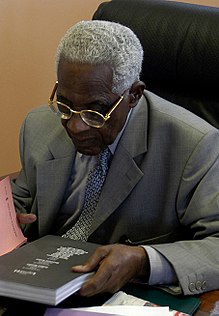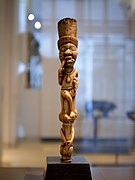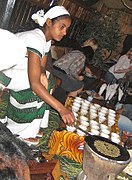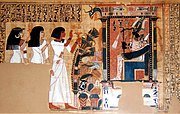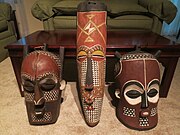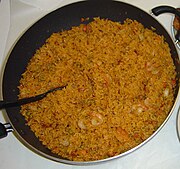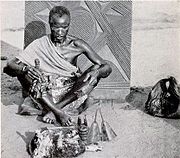-
Kenyan boys and girls performing a traditional folklore dance.
-
Sudanese basket tray, Tabar of weaved natural plant fibre, coloured in different colours.
-
A Yombe sculpture (Louvre, Paris).
-
Ashanti Kente cloth patterns.
-
An Ethiopian woman preparing Ethiopian coffee at a traditional ceremony. She roasts, crushes and brews the coffee on the spot.
-
BaKongo voodoo masks from the Kongo Central region.
-
Jollof rice, originally from the Senegambia region (Senegal and the Gambia), is a very popular dish.
IntroductionWelcome to the Pan-Africanism portal!
Bienvenue sur le portail panafricanisme!   Pan-Africanism is a worldwide movement that aims to encourage and strengthen bonds of solidarity between all indigenous peoples and diasporas of African ancestry. Based on a common goal dating back to the Atlantic slave trade, the movement extends beyond continental Africans with a substantial support base among the African diaspora in the Americas and Europe. Pan-Africanism can be said to have its origins in the struggles of the African people against enslavement and colonization and this struggle may be traced back to the first resistance on slave ships—rebellions and suicides—through the constant plantation and colonial uprisings and the "Back to Africa" movements of the 19th century. Based on the belief that unity is vital to economic, social, and political progress, it aims to "unify and uplift" people of African ancestry. (Full article...) Selected articleGarveyism is an aspect of black nationalism that refers to the economic, and political policies of UNIA-ACL founder Marcus Garvey. The ideology of Garveyism centers on the unification and empowerment of African-American men, women and children under the banner of their collective African descent, and the repatriation of African slave descendants and profits to the African continent. Garvey was fought by the African-American establishment in the U.S. An investigation by the Justice Department, directed by J. Edgar Hoover, led to Garvey's arrest on charges of mail fraud in January 1922, and his projects collapsed. Selected biography
Aimé Fernand David Césaire (/seɪˈzɜːr/; French: [sezɛʁ]; 26 June 1913 – 17 April 2008) was a Francophone and French poet, author and politician from Martinique. He was "one of the founders of the négritude movement in Francophone literature". His works included Une Tempête, a response to Shakespeare's play The Tempest, and Discours sur le colonialisme (Discourse on Colonialism), an essay describing the strife between the colonizers and the colonized. His works have been translated into many languages. Selected history
The Scramble for Africa was the occupation, division, and colonization of African territory by European powers during the period of New Imperialism, between 1881 and 1914. It is also called the Partition of Africa and by some the Conquest of Africa. In 1870, only 10 percent of Africa was under formal European control; by 1914 it had increased to almost 90 percent of the continent, with only Ethiopia (Abyssinia) and Liberia still being independent. There were multiple motivations including the quest for national prestige, tensions between pairs of European powers, religious missionary zeal and internal African native politics. The Berlin Conference of 1884, which regulated European colonisation and trade in Africa, is usually referred to as the ultimate point of the scramble for Africa. Consequent to the political and economic rivalries among the European empires in the last quarter of the 19th century, the partitioning, or splitting up of Africa was how the Europeans avoided warring amongst themselves over Africa. The later years of the 19th century saw the transition from "informal imperialism" by military influence and economic dominance, to direct rule, bringing about colonial imperialism. Selected cultureThe culture of Africa is varied and manifold, consisting of a mixture of countries with various tribes that each have their own unique characteristic from the continent of Africa. It is a product of the diverse populations that today inhabit the continent of Africa and the African Diaspora. African culture is expressed in its arts and crafts, folklore and religion, clothing, cuisine, music and languages. Expressions of culture are abundant within Africa, with large amounts of cultural diversity being found not only across different countries but also within single countries. Even though African cultures are widely diverse, it is also, when closely studied, seen to have many similarities. For example, the morals they uphold, their love and respect for their culture as well as the strong respect they hold for the aged and the important i.e. Kings and Chiefs. Africa has influenced and been influenced by other continents. This can be portrayed in the willingness to adapt to the ever-changing modern world rather than staying rooted to their static culture. The Westernized few, persuaded by European culture and Christianity, first denied African traditional culture, but with the increase of African nationalism, a cultural recovery occurred. The governments of most African nations encourage national dance and music groups, museums, and to a lower degree, artists and writers. Selection of images depicting African culture
Selected imagesOrganisationsAll-African People's Revolutionary Party · African Society for Cultural Relations with Independent Africa · African Unification Front · African Union · African Queens and Women Cultural Leaders Network · Conseil de l'Entente · Convention People's Party · East African Community · Economic Freedom Fighters · Global Afrikan Congress · International African Service Bureau · International League for Darker People · Organisation of African Unity · Pan African Association · Pan-African Congress · Pan Africanist Congress of Azania · Rassemblement Démocratique Africain · Pan Africa Chemistry Network · Pan African Federation of Accountants · Pan-African Freedom Movement for East and Central Africa · Sahara and Sahel Observatory · UNIA-ACL · ZANU–PF
See also
& Festivals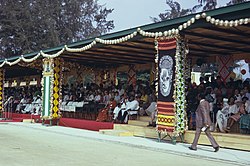 Photo by Helinä Rautavaara (1977) Publications
Films and TVAudios and videosDid you know ...that on arriving in Cuba in 1920, the SS Yarmouth (crew pictured), flagship of Marcus Garvey's Black Star Line, was hailed as the "Ark of the Covenant of the colored people"?
Selected quotesIn addressing the first ever conference of the Organization of African Unity (1st May 1963). The Gambian Pan-Africanist and nationalist Alieu Ebrima Cham Joof delivered the following message:
Pan-Africanism topicsCategoriesThings you can do
Related portalsAssociated WikimediaThe following Wikimedia Foundation sister projects provide more on this subject:
Discover Wikipedia using portals | |||||||||||||||||||||||||||||||
